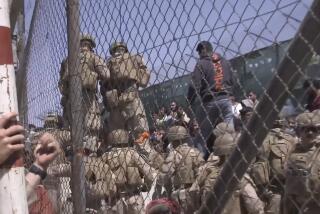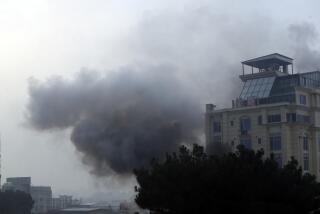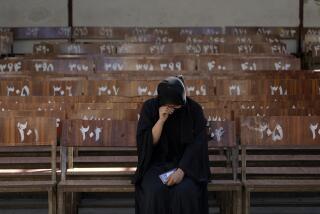Afghan suicide attacks mar U.S. Defense secretary’s visit
- Share via
KABUL, Afghanistan — Two deadly suicide bombings minutes apart Saturday morning marred Chuck Hagel’s maiden visit to Afghanistan as Defense secretary and served as a jarring reminder of the problems still facing the U.S. as it seeks to disengage from the 11-year-old war.
A bicyclist detonated explosives strapped to his body about 30 yards from a main entrance of the Defense Ministry in Kabul about 8:45 a.m., mowing down Afghans who were waiting in line to enter the compound, U.S. officials said.
The bomb killed at least nine civilians and wounded 14 people, including two Afghan army soldiers, the Defense Ministry said in a statement, making it one of the deadliest attacks in the capital in months.
Hagel was getting a briefing at a U.S. facility half a mile away when the blast occurred. The Taliban swiftly claimed responsibility for the attack.
“I wasn’t sure what it was,” Hagel later told reporters. “But we’re in a war zone. I’ve been in war. It shouldn’t be a surprise when bombs go off.”
Less than an hour later, a suicide bomber on foot tried to pass through a police checkpoint in the eastern province of Khowst, killing eight children and a police officer in the provincial capital of the same name, the deputy police chief said.
The provincial police official, Mohammad Yaqub Mandozai, said the bombing took place while police officers at the checkpoint were searching cars. No group immediately claimed responsibility for the attack.
U.S. officials had hoped Hagel’s visit would highlight what they say has been progress in turning over security responsibility to the Afghan army and police before the planned pullout of most American troops next year. But the two attacks, at a time when security measures in the Afghan capital were heightened for Hagel’s visit, only deepened questions about the government’s ability to stem the insurgency as the U.S. and its allies leave.
Separately, a ceremony to mark the formal transfer of a controversial U.S. detention facility to Afghan control was abruptly canceled because of a dispute over whether President Hamid Karzai’s government would continue to hold without charges some prisoners whom the U.S. doesn’t want released. Afghan officials said the ceremony would take place this week.
Disagreements between Karzai’s government and the U.S. have multiplied in recent weeks as attempts have been made to work out the terms of their changing relationship.
The Taliban said the Kabul attack was intended to show Hagel that insurgents could strike even in one of the most heavily guarded parts of the capital, a neighborhood of government buildings and military bases with numerous checkpoints and blast walls.
“This attack was a message to him,” Taliban spokesman Zabiullah Mujahid said in an email to reporters.
Hagel later flew to the eastern city of Jalalabad and awarded Purple Heart medals to two American soldiers wounded in December when an explosives-laden truck blew up outside a base in the region.
The ceremony to transfer the prison at Parwan to Afghan control was called off hours before it was to begin. The Afghan Defense Ministry, which had made plans to ferry reporters to the ceremony, issued a terse statement saying that the delay was “due to technical problems.”
At their meetings in January in Washington, according to U.S. officials, Presidents Obama and Karzai reached an agreement in principle that Afghanistan would continue to detain high-value terrorism suspects without trial.
However, in a speech Wednesday, Karzai appeared to suggest that he would release all the prisoners, saying that “innocent people” were being held in the prison and that “no matter how many complaints I receive, I will issue a decree that people should be released as soon as possible and return to their homes.”
More than 50 of the approximately 3,100 prisoners at Parwan are being held without charge, according to a report in September by the Open Society Institute.
Most of the prisoners are believed to have been captured by U.S. forces in nighttime raids on the homes of suspected insurgents and Al Qaeda-linked militants. The population of the detention facility has soared in recent years as the U.S. troop presence was built up and the controversial night operations increased.
An Afghan administrator oversees most of the prison’s operations, but the U.S. still has power to veto the release of detainees. The prisoners held under American authority do not get trials because the U.S. considers them prisoners of war.
U.S. officials had a meeting at the presidential palace Friday at which the final details were to be hammered out. One U.S. official who wasn’t authorized to be quoted said Saturday that if Karzai indicated that Afghanistan would release the high-value prisoners, “that would be a red line” for the United States.
Late Saturday, Karzai’s office issued a statement saying he and Marine Gen. Joseph F. Dunford Jr., the top U.S. commander in Afghanistan, had reached an agreement to turn over the prison this week.
Special correspondent Hashmat Baktash contributed to this report.
More to Read
Sign up for Essential California
The most important California stories and recommendations in your inbox every morning.
You may occasionally receive promotional content from the Los Angeles Times.















